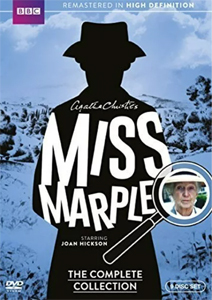The early 1980s was a proving ground for British TV producers, with their prime audience being the Agatha Christie estate. Christie didn’t care for unfaithful adaptations of her work (she never saw an on-point Poirot or Marple in her lifetime), and a course correction led to the faithful-to-a-fault 3-hour-plus “Why Didn’t They Ask Evans?” in 1980.
Later productions found a middle ground between faithful and bloated, and this approach culminated in one of the all-time gems among Christie adaptations: BBC1’s “Miss Marple” (1984-92). The series has two stars: One, Christie’s mysteries, and two, Joan Hickson. (And arguably a third: The jaunty yet rather epic theme music by Ken Howard and Alan Blaikley.)
Hickson’s Jane Marple has the pursed lips, judging glances, occasional wry one-liners (“Americans have a lot to answer for,” she says when the topic of international muffins arises) and even that “twinkle in her eye” that Christie often writes about. She’s everyone’s beloved aunt (at least four nephews or nieces appear), yet she doesn’t hold with murder. Hickson is even more of an accurate Marple than David Suchet is a Hercule Poirot.

“Miss Marple” (1984-92)
12 adaptations (over 26 episodes), BBC1
Producer: George Gallaccio
Writers: T.R. Bowen, Julia Jones, Alan Plater, Ken Taylor, Jill Hyem
Stars: Joan Hickson, David Horovitch, Ian Brimble
Midcentury murders
“Miss Marple” squeezes the 12 novels into the Fifties – rather than the Thirties through the Seventies – but maintains Christie’s themes about British societal change. The adaptations retain the commentaries on the serious money that can be made if you’re a great secretary or head of servants, as with Miss Dove in “A Pocketful of Rye” (installment 4) and Lucy Eyelesbarrow in “4:50 from Paddington” (9).
The author’s reflections on how the titular old-fashioned hotel has become an anachronism remains in “At Bertram’s Hotel” (7). The setting is transposed a decade earlier, but the newfound popularity of TV emphasizes the “times are changing” message.
The books are adapted out of order, but this doesn’t matter except in the case of “A Caribbean Mystery” (10) following “Nemesis” (8) despite taking place first. Marple meets Jason Rafiel on a Caribbean vacation, then Rafiel hires her from beyond the grave for what most Marple readers believe is the sleuth’s final chronological case in “Nemesis.” When watching on DVD or streaming, we can make our own chronology, of course.
Not surprisingly, considering the production’s care and intelligence, the non-chronological shooting order is not a sloppy mistake. The series had to wait for the rights for three novels – “Caribbean,” “They Do It With Mirrors” (11) and “The Mirror Crack’d from Side to Side” (12) – to become available. There was a brief concern that those novels wouldn’t be adapted for “Miss Marple.”
Had it gone longer, perhaps we would’ve seen the 20 Marple short stories made into single episodes. Oddly, even “Agatha Christie’s Marple” (2004-13) mostly avoided the short stories. Sure, Marple just sits in an armchair and knits while verbally explaining whodunit, but Hickson could’ve made that amusing.

Great adaptations
As it stands, the 12 novels are each split into two episodes of about 50 minutes, except for “The Body in the Library” (1) and “A Murder is Announced” (3), which are three episodes each, perhaps owing to their rather showy premises. The first is a little dreary out of the gates, whereas I got into the spirit of the latter. Generally, two episodes is the right length, and writers T.R. Bowen, Julia Jones, Alan Plater, Ken Taylor and Jill Hyem do an excellent job of being faithful to the novels.
In “Nemesis,” though, Bowen notably improves on the author’s last-written Marple book. Christie was loosely edited late in her career, resulting in some plot and logic holes. Bowen has Michael Rafiel be a persecuted but contented drifter, rather than wrongfully imprisoned. Thus it makes more sense why his father wouldn’t have a sense of urgency about seeing Michael’s name cleared. Bowen’s script also adds a nephew to serve as Marple’s sounding board, thus solving the problem of the novel’s internal monolog.
The producers capture the Fifties well – notably the way massive English family estates were run by servants, rather than technology – with the exception of “They Do It With Mirrors” and “The Mirror Crack’d,” which accidentally have an early 1990s vibe.
Aside from those episodes, everything feels like the midcentury, with unrushed discussions over tea and cakes, even when a murderer is loose. The vibe is an overcast gray that makes you feel not guilty about staying inside and watching old TV – with Marple’s trip to sweaty and buzzing Barbados (where “Caribbean” was filmed) providing one contrast.
The cinematography particularly stands out in “The Murder at the Vicarage” (5). The novel is sunny and funny, whereas the adaptation emphasizes nighttime scenes and is rather grim – but not in a bad way.
Standout performances
Following Hickson’s lead, almost every actor portrays book characters like I pictured them. But there are some particular standouts:
- Renée Asherson nails the innocence of the always-smiling Miss Bunner in “A Murder is Announced,” making her the series’ most sympathetic victim. Despite being three episodes long, this adaptation is a standout due to a top-to-bottom compelling cast.
- Paul Eddington shines as Clement the vicar in “Vicarage.” In the book, he’s the narrator, since Marple’s emergence as a brilliant amateur sleuth is a surprise – this being her first novel. Despite the TV show being structured differently, Clement remains a wryly observant center.
- Aussie-accented Geraldine Alexander is like a horror-movie heroine as Gwenda in “Sleeping Murder” (6). The adaptation almost – but not quite – achieves a spooky vibe on par with the excellent 1972 adaptation of the non-Marple story “Endless Night.”
- It’s fun to see Caroline Blakiston as diva Bess Sedgwick in “Bertram’s.” Like many Americans, I only knew her as the staid Mon Mothma in “Return of the Jedi.”
- The interplay between Hickson and “Halloween’s” Donald Pleasence, as the brusque oldster Rafiel, gives “Caribbean” the spice it needs.
Among recurring characters, I like David Horovitch as Inspector Slack. He appears in five episodes as the police investigator who is extremely peeved by Marple but must try to hold this in because 1, he wants to appear professional, and 2, deep down he knows Marple will be helpful. The smirks from second-in-command Lake (Ian Brimble) mirror those of the viewer.
But John Castle is even better as Inspector Craddock. He appears only in “A Murder is Announced” and “A Mirror Crack’d,” but Castle’s sleepy charisma carries the procedural aspect. Oddly, the latter installment features a bizarre continuity error (especially for such a detail-oriented series): Craddock suddenly becomes Marple’s nephew, even though he certainly was not in his previous appearance, where they meet for the first time.
Some nitpicks
Not every episode is perfect, so here are some nitpicks:
- “The Moving Finger” (2) misses a chance for a standout character as Deborah Appleby’s Megan, who is supposed to undergo a “Pygmalion”-like transformation, is a little flat. And reducing the makeover sequence to a quick montage only emphasizes that the adapters were embarrassed by this cliched part of Christie’s story.
- “A Pocketful of Rye” (4) becomes dreary because of its utter lack of likable people; even Tom Wilkinson as Inspector Neale can’t improve it.
- Elvira Blake (Helena Michell) could’ve been more conniving and mysterious in “Bertram’s.”
- “Paddington” is generally strong, with John Hallam’s Cedric aggressively hitting on Jill Meager’s Lucy with lines like “You look edible.” That’s racy for “Miss Marple.” But on a down note, the book’s vibe is helped by the reveal of corpses – including one in a “Raiders of the Lost Ark”-esque storage barn. In English TV tradition, we don’t see the horrifically decomposing bodies, so the adaptation feels censored.
High fidelity
Other than Hickson’s performance, fidelity to the novels is “Miss Marple’s” most consistent strong point, so much so that when it adapts Christie’s overblown action prose, it keeps the cheese in there. Most blatant is the hilarious conclusion to “Bertram’s,” when Bess Sedgwick loses her mind, climbs the side of a building, runs across rooftops and crashes her car.
In the end, though, a sense of reserve is what makes “Miss Marple” great. Hickson is a star, but unlike with Suchet in “Poirot,” the producers don’t augment the title character’s screen time from the novels. Every time the spinster sleuth is on screen, the show gets better, sure. But when she steps into an already strong mystery of Christie’s – as probed by Craddock or Slack – it’s like adding frosting to cake.
And I’m not talking about the accurately named rock cakes that Miss Marple would smartly avoid.
Sleuthing Sunday reviews an Agatha Christie book or adaptation. Click here to visit our Agatha Christie Zone.

